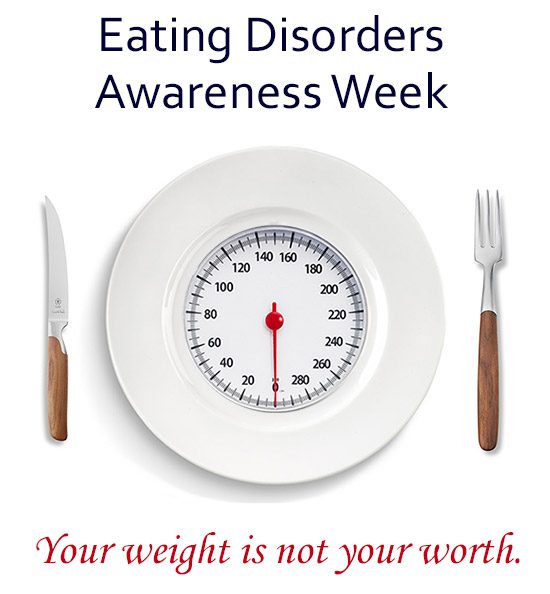February 22 to 28, 2021 (United States)
The stereotype is that serious and life-threatening eating disorders only effect a certain segment of the population. Among the most common misconceptions is that teenage girls and young women are more likely to fall prey to these illnesses. The fact is it’s common across all genders, which is why Eating Disorders Awareness Week is so important.

“That [stereotype],” Claire Mysko, CEO of the National Eating Disorder Association, tells Teen Vogue, “doesn’t match up with the reality of who struggles. People of all ages, gender, sizes, races, ethnicities and socioeconomic statuses struggle with eating disorders. The myths about eating disorders are really a barrier for people reaching out for help.”
Eating Disorders Awareness Week
February 22 to February 28, 2021, is National Eating Disorders Awareness Week (NEDA), recognized every year in February in the United States.
This annual recognition is meant to give a voice to people at “all stages of body acceptance and eating disorders recovery.”
“We invite everyone, especially those whose stories have not been widely recognized, to have the opportunity to speak out, share their experiences, and connect with others,” announces NEDA’s website.
Research suggests that as many as 20 million women and 10 million men will suffer from an eating disorder at one point in their lives.
Whether or not they recognize they might be suffering from an eating disorder is an altogether different conversation.
What are the Most Common Eating Disorders?
Perhaps the most well known eating disorders are anorexia nervosa and bulimia nervosa.
These separate disorders are often lumped together in the public consciousness, despite the fact that they’re very different. Here some of the key elements of the two illnesses:
Bulimia Nervosa
Bulimia Nervosa is characterized by:
- Binge eating episodes
- Feeling no control or a lack of control over these episodes
- Engaging in behaviors to prevent weight gain, such as vomiting, excessive exercise and the misuse of laxatives, enemas or diuretics
What develops with this disorder is a distorted view of how a person’s body shape and weight affect their self-worth.
Anorexia Nervosa
Anorexia Nervosa is characterized by:
- A person not being able to maintain a normal weight based on their age and height
- An extreme fear of weight gain even if they’re already underweight
Left untreated, people with this disorder often develop an inability to acknowledge the seriousness of their low bodyweight.
There are also people who suffer from eating disorders that might not perfectly fit with the diagnoses of anorexia or bulimia.
Binge Eating Disorder
Binge Eating Disorder (BED) differs from bulimia because a person suffering from BED does not typically engage in purging.
As a result, they often become unhealthily overweight or obese, which leads to even more health concerns.
Other Specified Feeding and Eating Disorders
Other Specified Feeding and Eating Disorders (OSFED), despite being a sort of catch-all category for eating disorder diagnoses that don’t match the typical mold, is still very damaging and life threatening.
The Diagnostic and Statistical Manual of Mental Health (DSM-5), often referred to as “the bible of psychiatry,” has included OSFED in its two most recent editions.
As many as 30 percent of people seeking treatment for an eating disorder are diagnosed with OSFED, according to the National Eating Disorders Collaboration.
Early Intervention is a Key to Successful Recovery
Reaching out for help or even gently confronting a loved one or friend with a possible eating disorder is never easy. It might be, however, a life-saving move.
Eating disorders, though difficult to treat, are not insurmountable. As with other mental health issues, such as alcoholism and substance abuse, the earlier eating disorders are diagnosed and treated, the better the chances for recovery, especially when they co-occur with other issues.
The infographic shown here is from the NEDA website and shows the statistics for eating disorders combined with co-occurring disorders.

Add National Eating Disorder Awareness Week to your mental health awareness calendar during February and take some time to watch a few movies about eating disorders to get educated on these very serious health issues.
Education, awareness and action might just be the key to a person’s survival.
Related:
The Brain-Gut Connection to Mental Health
Nutritional Psychiatry and the Treatment of Mood Disorders
Neurotransmitter Boosting Foods to Improve Overall Wellbeing
Mental Health Awareness Events Calendar





